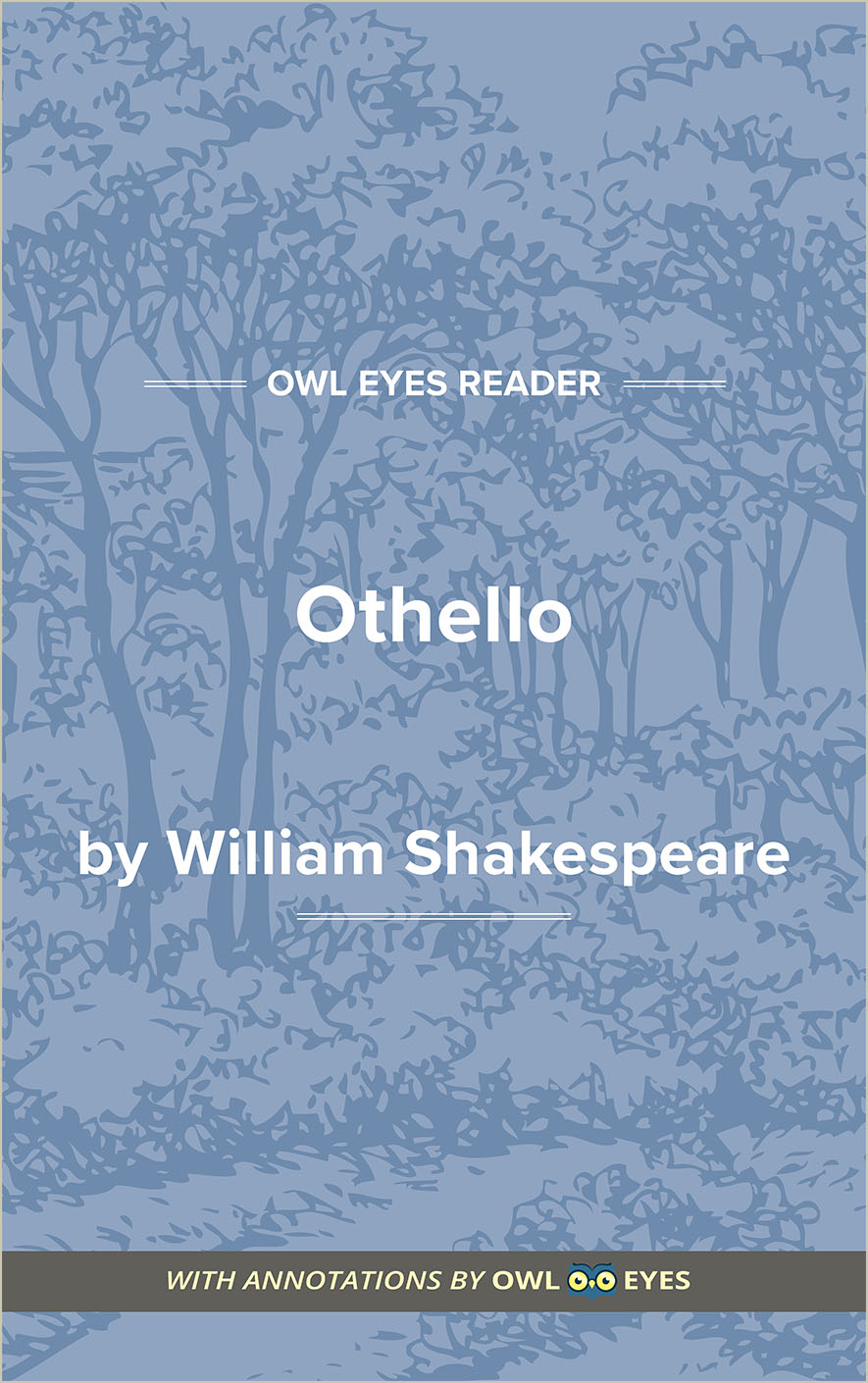Analysis Pages
Irony in Othello
As is the case with many Shakespeare plays, Othello contains a great deal of dramatic irony. In Othello, Iago is the source of nearly all irony, a direct result of the lies and deceptions he spreads. While the honesty of numerous characters is called into question, Iago’s never is. Iago presents two distinct sides: the plotting villain he shares with the audience alone, and the faithful officer he shares with the other characters. While Othello calls him “honest Iago,” his honest side is the malevolent persona Othello sees only at the play’s conclusion.
Irony Examples in Othello:
Act I - Scene I
🔒"I am not what I am...." See in text (Act I - Scene I)
Act I - Scene II
🔒"I lack iniquity..." See in text (Act I - Scene II)
Act II - Scene I
🔒"Now, for want of these required conveniences, her delicate tenderness will find itself abused, begin to heave(245) the gorge, disrelish and abhor the Moor;..." See in text (Act II - Scene I)
"The heavens forbid But that our loves and comforts should increase, Even as our days do grow!..." See in text (Act II - Scene I)
"who stands so eminently in the degree of this fortune as Cassio does? A knave very voluble;..." See in text (Act II - Scene I)
"Now, for want of these required conveniences, her delicate tenderness will find itself abused, begin to heave(245) the gorge, disrelish and abhor the Moor;..." See in text (Act II - Scene I)
"The heavens forbid But that our loves and comforts should increase, Even as our days do grow!..." See in text (Act II - Scene I)
Act II - Scene III
🔒"Reputation is an idle and most false imposition; oft got without merit and lost without deserving...." See in text (Act II - Scene III)
"Touch me not so near: I had rather have this tongue cut from my mouth Than it should do offense to Michael Cassio;..." See in text (Act II - Scene III)
Act III - Scene I
🔒"I never knew(40) A Florentine more kind and honest...." See in text (Act III - Scene I)
Act III - Scene III
🔒"Not to affect many proposed matches Of her own clime, complexion, and degree, Whereto we see in all things nature tends—(260) Foh, one may smell in such a will most rank,..." See in text (Act III - Scene III)
"But he that filches from me my good name(180) Robs me of that which not enriches him And makes me poor indeed...." See in text (Act III - Scene III)
"And didst contract and purse thy brow together, As if thou then hadst shut up in thy brain Some horrible conceit...." See in text (Act III - Scene III)
"But for a satisfaction of my thought; No further harm...." See in text (Act III - Scene III)
"For if he be not one that truly loves you, That errs in ignorance and not in cunning, I have no judgement in an honest face: I prithee, call him back...." See in text (Act III - Scene III)
"Cassio, my lord! No, sure, I cannot think it, That he would steal away so guiltylike, Seeing you coming...." See in text (Act III - Scene III)
Act III - Scene IV
🔒"But jealous for they are jealous. 'Tis a monster(170) Begot upon itself, born on itself. DESD: Heaven keep that monster from Othello's mind!..." See in text (Act III - Scene IV)
"Fetch me the handkerchief, my mind misgives...." See in text (Act III - Scene IV)
"This hand is moist, my lady...." See in text (Act III - Scene IV)
"O, hardness to dissemble!..." See in text (Act III - Scene IV)
"but my noble Moor Is true of mind and made of no such baseness As jealous creatures are, it were enough To put him to ill thinking...." See in text (Act III - Scene IV)
"I know not, madam...." See in text (Act III - Scene IV)
Act IV - Scene I
🔒"Fire and brimstone!..." See in text (Act IV - Scene I)
"This is some minx's token, and I must take out the work?..." See in text (Act IV - Scene I)
"Lie—(40) OTHELLO: With her? IAGO: With her, on her, what you will...." See in text (Act IV - Scene I)
"Her honor is an essence that's not seen; They have it very oft that have it not:..." See in text (Act IV - Scene I)
Act IV - Scene II
🔒"Here I kneel: If e'er my will did trespass ‘gainst his love Either in discourse of thought or actual deed, Or that mine eyes, mine ears, or any sense, Delighted them in any other form,(175) Or that I do not yet, and ever did, And ever will, though he do shake me off To beggarly divorcement, love him dearly, Comfort forswear me!..." See in text (Act IV - Scene II)
"Some cogging cozening slave, to get some office,(150) Have not devised this slander; I'll be hang'd else. IAGO: Fie, there is no such man; it is impossible...." See in text (Act IV - Scene II)
Act V - Scene I
🔒"O damn'd Iago! O inhuman dog!..." See in text (Act V - Scene I)
"Strumpet, I come! Forth of my heart those charms, thine eyes, are blotted; Thy bed, lust-stain'd shall with lust's blood be spotted...." See in text (Act V - Scene I)
"’Tis he. O brave Iago, honest and just, That hast such noble sense of thy friend's wrong! Thou teachest me. Minion, your dear lies dead,(35) And your unblest fate hies...." See in text (Act V - Scene I)
Act V - Scene II
🔒"It is the very error of the moon;(130) She comes more nearer earth than she was wont And makes men mad...." See in text (Act V - Scene II)
"Have you pray'd tonight, Desdemona?..." See in text (Act V - Scene II)

